It’s been written with input and feedback from a range of experts in this field including:
- Prof Minesh Khashu – with his clinical and practical expertise and experience as a Consultant Neonatologist and Professor of Perinatal Health;
- Julian Bose and the team at DadPad – with their collective expertise and experience in working with and producing high-quality, bespoke materials, custom-written for dads’ specific needs;
- neonatal dads, both current and past; and
- experienced neonatal nurses.
The book has been specifically designed to be used as a ‘quick start’ guide, covering dads’ most immediate concerns, such as:
- How are you feeling?
- What is the neonatal unit?
- Why has my baby been admitted to the neonatal unit?
- What level of care is my baby receiving?
- The first few days
- Some common first questions
From here, the DPNN changes into a more in-depth guide, covering things like equipment, who is looking after your baby, developmental care, baby’s development, how you can get involved with the day-to-day care of your baby, and multiple births.
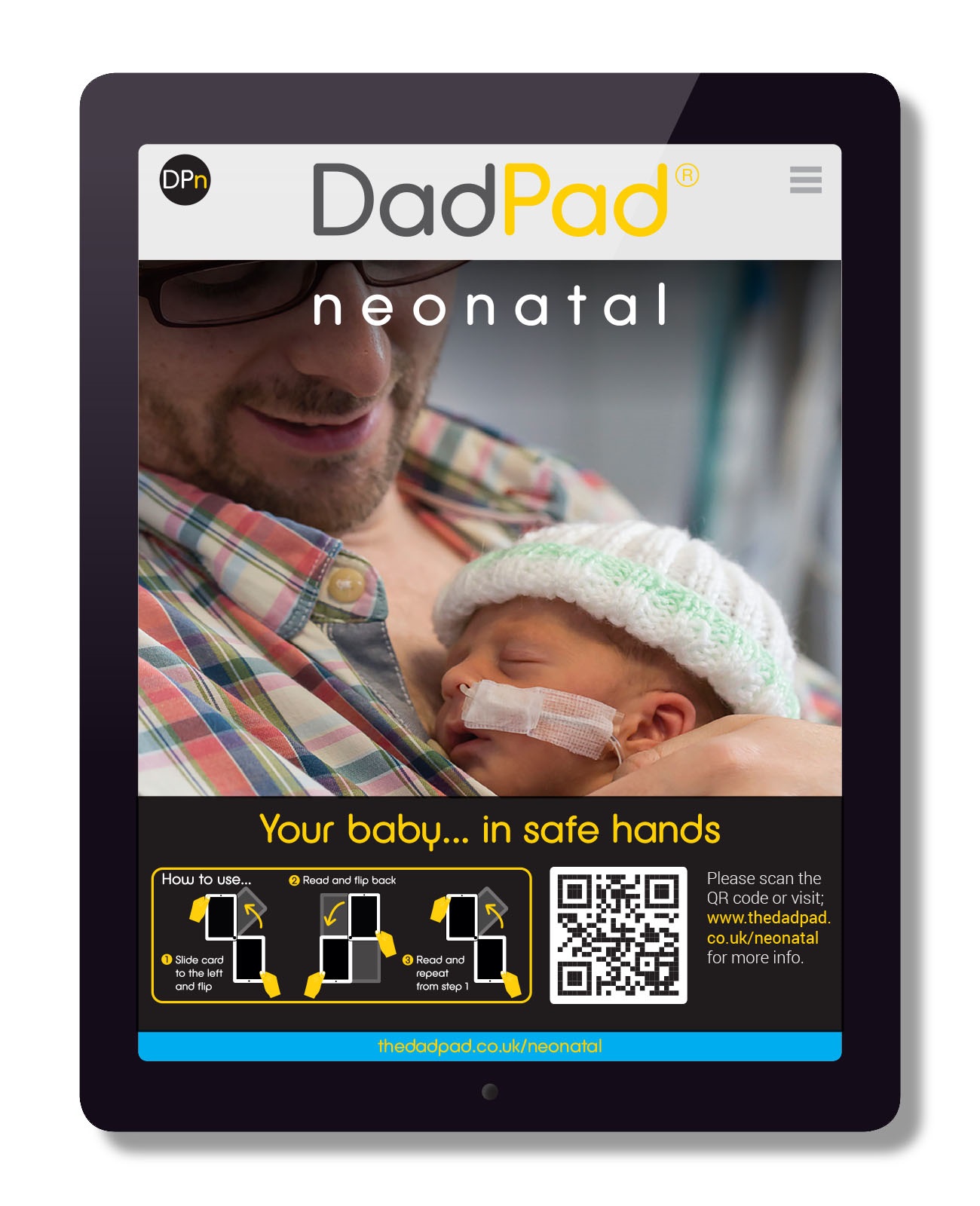
How did the idea come about?
Back in 2018, DadPad CEO and founder Julian was speaking about DadPad at an event in Hampshire, explaining how the resource helps to solve the challenges that perinatal services have in engaging, supporting and including new fathers. At this event, he was approached by Prof Khashu, and together they discussed and explored the possible adaptability of the existing DadPad resource to include fathers of pre-term and unwell babies.
Prof Khashu has commented:
DadPad is such a good idea for new dads, bringing together a range of information in a handy and convenient pack. I was excited about the potential opportunities for neonatal units and keen to develop a specialised version for this purpose.
Julian was struck by the notion that this set of fathers would not only face the extra challenges that having a neonatal baby brings once home, but would also – like many other new fathers – have not just the Maternity Department but also now the Neonatal Unit as their first ever, first-hand experience of being in a baby-focused clinical environment. This can be daunting and unfamiliar at the best of times, but a Neonatal Unit would be even more fear-inducing, with its extra equipment and specialist terminology that dad would have no prior knowledge of, especially as he’s unlikely to have planned or expected to be there.
With all this in mind, Julian immediately recognised that a neonatal version of the DadPad could be a tool to help inform and support a new dad in the first few minutes, hours, days and weeks of arriving on the Neonatal Unit with his premature or unwell baby. It could act as a calming and reassuring influence, helping him to better understand and articulate to the neonatal team the worries surrounding his family that he would inevitably have.
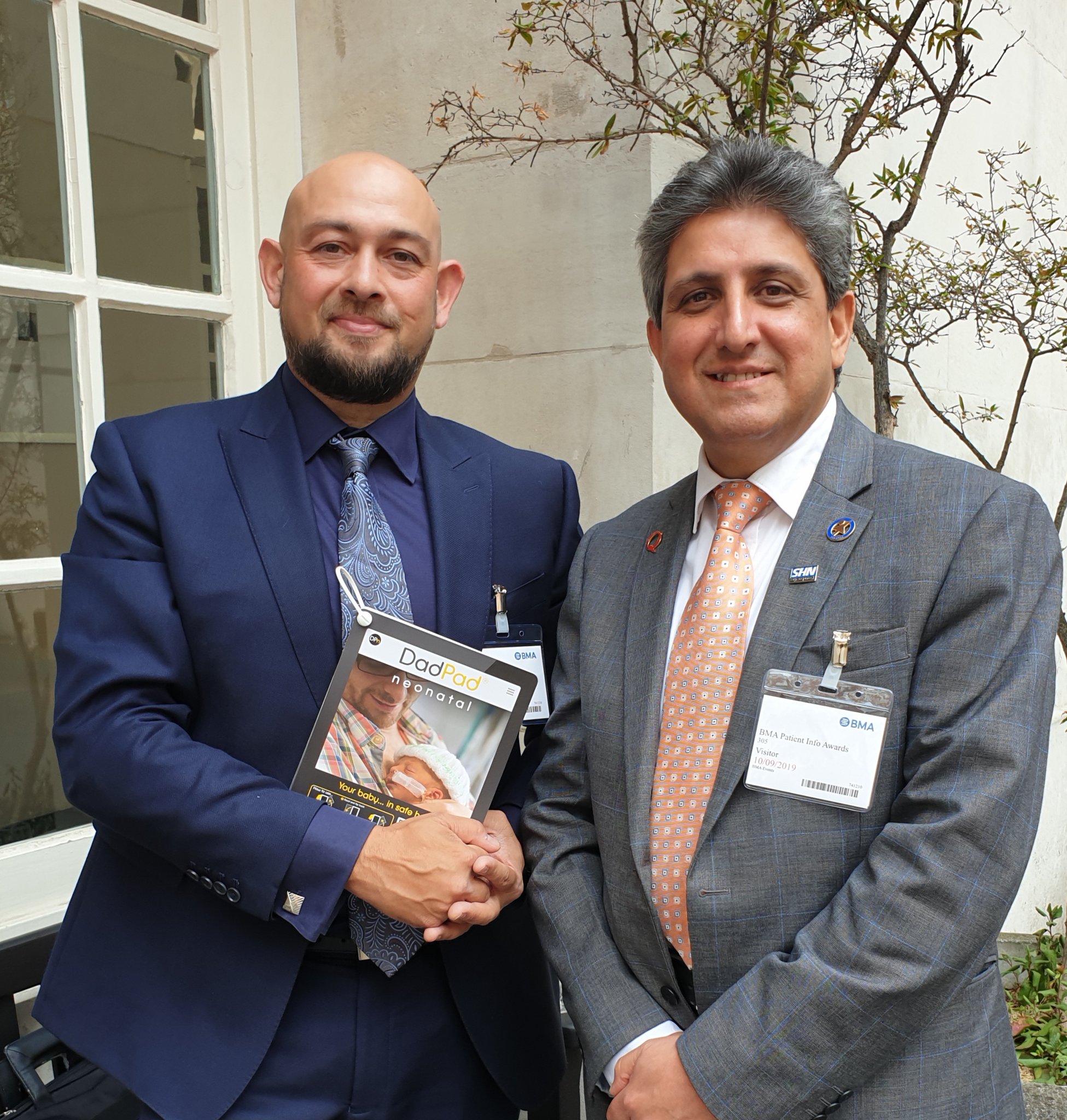
Julian Bose (left), DadPad CEO, with Prof Minesh Khashu, Consultant Neonatologist at Poole Hospital, Dorset.
Julian said:
Becoming a new dad is already difficult enough to come to terms with. However, being the parent of a child in neonatal care potentially comes with a whole lot of other emotions and problems, and there will definitely be more information to understand about your new baby.
Sometimes, when a child is in neonatal care, medical attention may be required for both baby and baby’s mum, initially leaving the dad completely alone to come to terms with the situation. This can be traumatic, and we hope that DadPad Neonatal will become a valuable tool to offer support and advice during this sensitive time.
Fast forward a few weeks, and Julian and Minesh met again to start pulling together the concept and content. Following the exchange between Minesh (who was also liaising with the dads on his Unit, and dads with prior experience of being on the Neonatal Unit) and the DadPad team (who were also liaising with neonatal nurses on their own local Unit) of somewhere in the region of 27 draft versions and edits over the next two years, the first set of DadPads Neonatal were delivered to Minesh and team at the Neonatal Unit at Poole Hospital in the summer of 2018, where the resource was launched at a celebration event which thanked all the families and professionals who had contributed to the latest DadPad product.
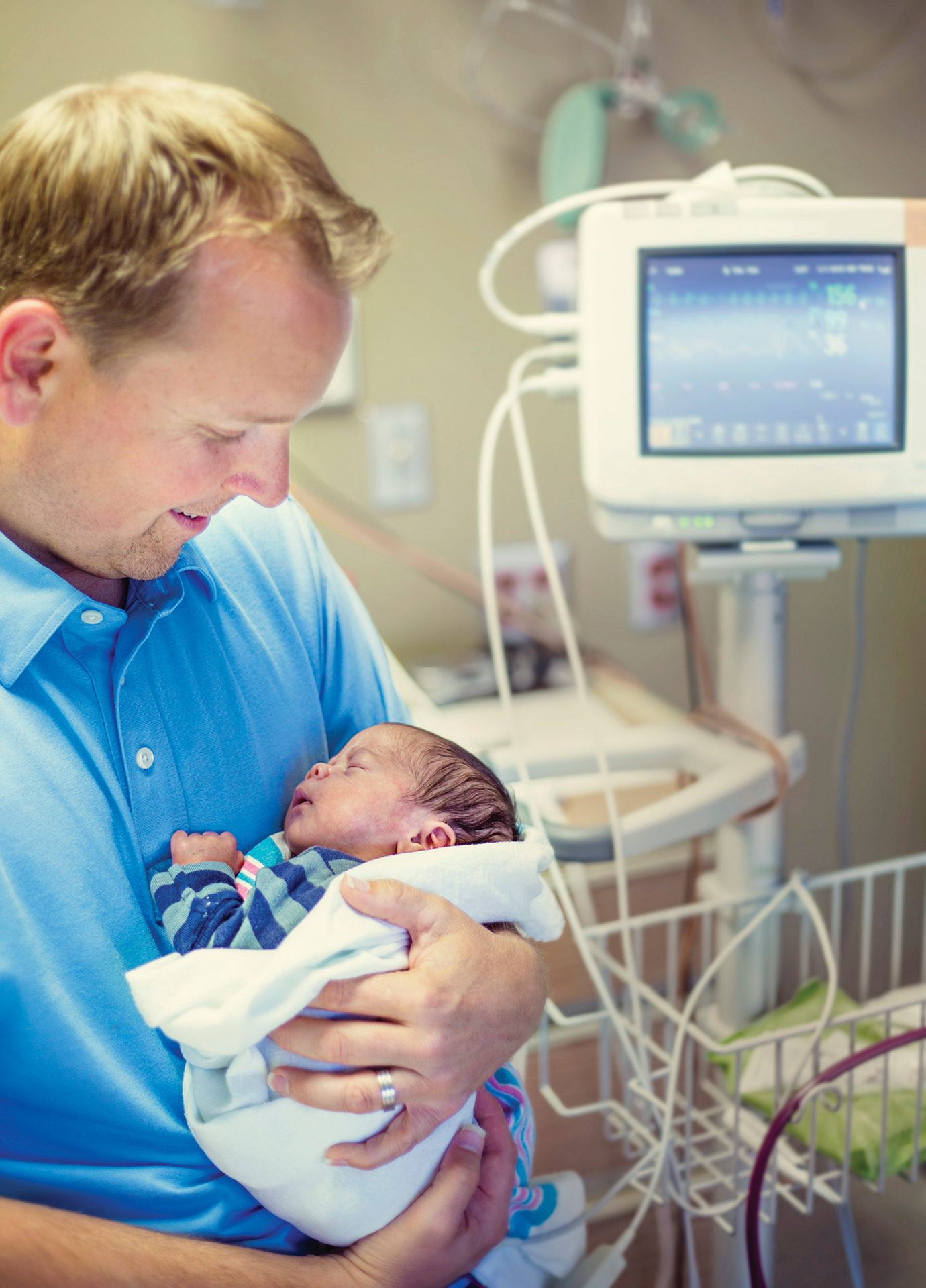
How does the DPNN work?
If used as intended, the DPNN works on a number of levels:
On arrival at the Neonatal Unit:
Clearly, for all new families, arriving at the Neonatal Unit will be a huge shock, with emotions running high. Dad may well be experiencing a mix of:
- euphoria – at having just seen his child born, and having become a dad…
- fear and anxiety – at realising that his baby needs special medical care…
- worry – about and/or on behalf of this partner…
- trauma – at having witnessed the birth develop in an unexpected way…
… and many other emotions. Above all, his head will be spinning, and yet he will more than likely be expected to take on board – on behalf of his whole, new family – lots of new and complex information.
Handing each new dad, upon arrival at the Neonatal Unit, his own copy of the DPNN can really help in this moment by:
- helping him feel valued and recognised in his own right – despite all the negative emotions that might be around, he’s effectively being congratulated on having become a dad, and receiving something to signify this;
- letting him know that a path has been prepared for him, that the team around his family appreciates and understands how he’s going to be feeling, and that something has been purposely put in place to help make things as easy as possible for him;
- using the DPNN alongside each interaction between dad and the neonatal team, the information being shared will be easier to process and dad will hopefully experience less worry about having to try and ‘remember’ it all. The clearly-set-out and clearly-explained medical information and practical advice, with colour ‘real-life’ pictures, will help aid his understanding and engagement.
On return to the family unit:
One of dad’s main roles at this time is likely to be the liaison between mum/hospital and home. When friends and family ask dad all the inevitable questions – what’s happened? what’s wrong with baby? why is baby on the neonatal unit? what treatment is baby receiving and why? etc – the DPNN will enable dad to have all the information he needs at his fingertips.
By including spaces for dad to ‘tick’ the sections that apply to his baby, recalling the information that was shared with him at the hospital becomes much simpler.
The same, of course, also applies when feeding back to mum, especially in the early hours and days when she may not be able to be on hand in the Neonatal Unit herself, but will still be desperate for all the news, information and updates that she can get.
Whilst on the Neonatal Unit:
By giving dad his own copy of the DPNN, he always has the resource on hand to refer to – no need to wait for the ‘loan’ copy to become free, or to worrying about hogging it when others might want to access the information.
Whilst sitting alongside his baby, he will be able to continue to browse the resource, as well as using it to look up any words or phrases that he hears but doesn’t understand. To help with the latter, a glossary has been included at the back of the resource. There’s also spaces for dad to note down any questions he might have, so that he has them easily to hand when he next has the opportunity to ask them. This should all help dad feel more confident, more included and more empowered during his time on the Unit.
The emphasis throughout the resource is on highlighting to dad the ways in which he can and should expect to be involved, thus helping to embed the FiCare Model of neonatal care.
And we’ve made sure that the DPNN is both durable and wipe-clean, so that it is able to withstand frequent and regular use within the Neonatal Unit.
Coping with emotions:
Of course, as well as all the practical information, it’s important that dad recognises the emotional impact that this time will be having on both him and baby’s mum. The DPNN therefore includes lots of information on how dad can look after both himself and baby’s mum, and where to go for further support, as well as giving dad the opportunity to record and reflect upon his own feelings.
Preparing to leave the unit:
The DPNN also includes key information on all aspects of going home – including when it might happen, what dad and mum will need to do to get ready for baby’s homecoming, how to prepare themselves, and how to cope once the big day arrives.
Much later…
One of the core aims for the DPNN was that it wasn’t just a manual for surviving the Neonatal Unit; we also wanted it to develop into a keepsake memento for dad to share with his baby when they are older. The start of any baby’s life is a precious and important time, and therefore all opportunities should be taken to record the positives, so that they do not get lost.
The DPNN therefore includes spaces for dad to include photos and to keep a record of his own emotions, the names of those who cared for his baby, the dates when baby met key milestones on the Unit, and other special memories of the family’s time in Neonatal.
All of this – both at the time of recording and later, when sharing – will help, of course, to build and strengthen the all-important bond and attachment between dad and child.
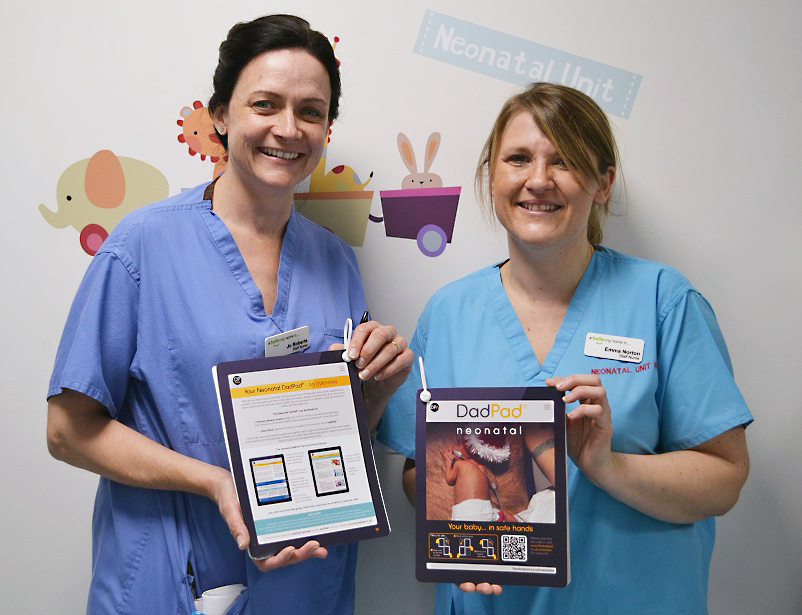
Jo Roberts (left), staff nurse, and Emma Norton (right), neonatal nurse at Royal Cornwall Hospital Treliske, in 2017, holding preview copies of the DadPad Neonatal, prior to its initial launch. [Picture from Business Cornwall]
Why is the DPNN needed?
There are lots of good reasons – many of them evidenced via academic research – as to why the DPNN is a vital tool to have within a Neonatal Unit. For World Prematurity Day in November 2020, we were approached by Joanne King, a Health Visitor from Wolverhampton, to write a guest blog for us in which she shared some of the key findings from her dissertation on bonding and attachment from the perspective of a dad with a baby on a neonatal unit. You can read her blog post in full here, but a summary of some of her key points – with a link each time to how the DPNN can help – is set out below:
- parents often feel a sense of loss of (and almost a form of grief for) what they imagined life with their baby would be like, with some parents describing their reactions as being similar to experiencing post-traumatic stress disorder (PTSD). Similarly, research has found that dads either experienced a loss of emotions at this time, and/or felt that they could not show their emotions in front of baby’s mum, believing instead that he needed to be strong and supportive for her – the DPNN encourages dad to acknowledge the emotions he is experiencing, and to seek help and support at the earliest possibility, if he feels this is needed;
- care in a Neonatal Unit needs to be family-focused, with a huge involvement from both parents, but dad can often be missed or overlooked by staff, and even sometimes by baby’s mum, all of which can have a real negative impact on the family unit, going forward – adopting the DPNN as part of the integrated care provided within a Neonatal Unit ensures that dad not only doesn’t get forgotten about, but is also made to feel valued and important;
- dads reported feeling left out and not involved as a result of staff:
- not giving dads the opportunity to become involved with the care of their baby, despite evidence that this hugely helped with bonding, and developing dads’ feelings of involvement – the DPNN reminds dads of their importance as a primary care-giver to their new baby, suggesting ways that he can get and should expect to be involved;
- using medical terminology that the dads did not always understand – the DPNN provides dad with a glossary where he can look up these words or phrases for himself, empowering him to ask more questions and get more involved in discussions surrounding the care of his baby; and
- giving conflicting advice and information – by providing opportunities for dad to record the information that is being shared with him in relation to his baby’s care and development, he will feel more confident in checking and questioning instances where he believes there is conflict; and
- dads have reported that, where they are encouraged by staff to get involved, or where staff made themselves available to parents when visiting the Unit, this had a positive impact on dads’ overall experience and limited their feelings of stress and fear that they were experiencing – having the DPNN as an integrated part of a Unit’s practice, better relationships will be formed between dad and the neonatal team, which will empower dads, helping them to feel more confident and more bonded with their baby.
We also believe that the DPNN is a core component of any Unit’s adoption of the FiCare Model of neonatal care, which we’ll look at in a separate blog post.
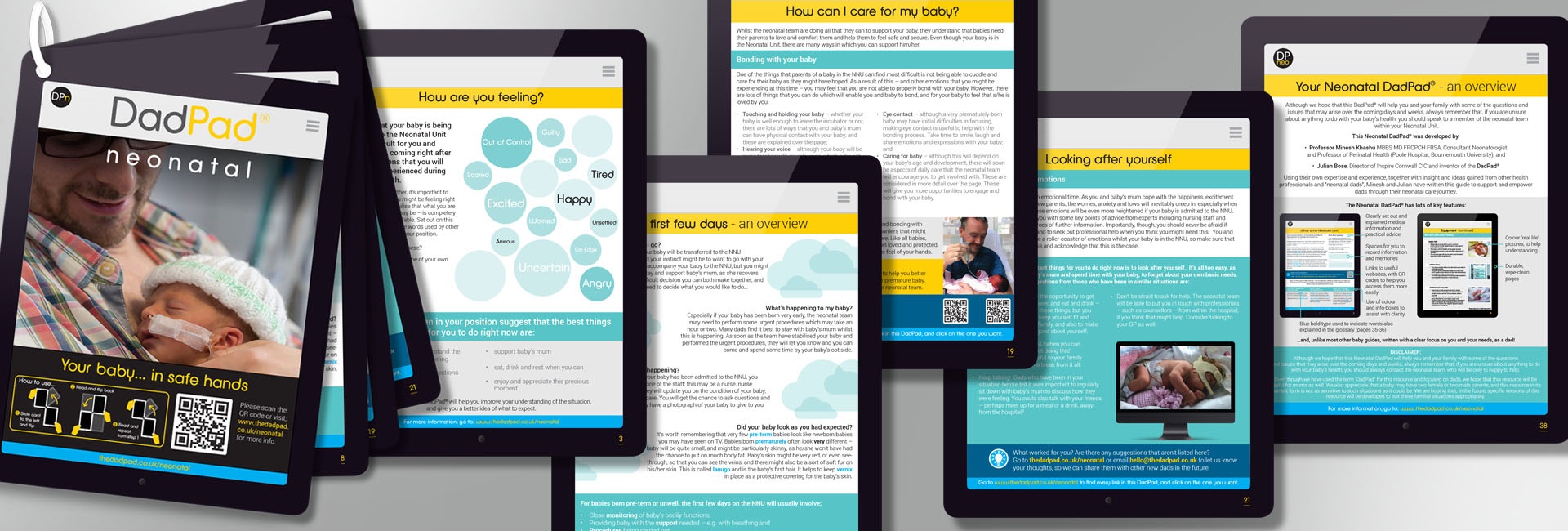
How was the DPNN funded?
Funding from the National Lottery’s Awards4All allowed the concept to be developed. The rest of the development, production and initial printing was funded by Inspire Cornwall CIC, as part of their reinvestment in perinatal support for new families, within their profit-for-purpose mission.
The resource was initially launched in two Units in 2018: Minesh’s ‘home’ Neonatal Unit within Poole Hospital, Dorset, and the neighbouring Unit to DadPad HQ, at the Royal Cornwall Hospital Treliske, in Cornwall.
But isn’t it sexist to have written a neonatal resource solely for dads? What about other family demographics?
You can find out more about the reasons why our DadPad resources need to be written specifically for dads here, but some of the key reasons for writing them as ‘the DadPad’ (and not, for example, ‘the ParentPad’) are:
- with the original DadPad, health professionals wanted a resource that they could use to engage and include new dads and dads-to-be, as this group were acknowledged as lacking targeted provision, resources, involvement and engagement during the perinatal period, despite figures from The Fatherhood Institute (2018) suggesting that “almost all births (95%) are now registered by a mother and father together with around 85% of parents living at the same address (married or cohabiting)”. These dads – and their families – therefore need and deserve to be supported;
- research evidence has established that dads need to be explicitly addressed in order to engage and feel included: using the word ‘parent’ in the perinatal context will make most people (and dads in particular) read it to mean ‘mum’; and
- research evidence has also confirmed that the postnatal needs of a male dad with a female partner will be quite different to those of non-birthing parents in different relationships.
We do, though, have a new resource – similar to the DadPad, but aimed at and written for the specific needs of LGBTQI+ non-birthing parents. You can find out more about the Co-ParentPad here. The team at DadPad are looking to develop an LGBTQI+ version of the DPNN in the near future, too.
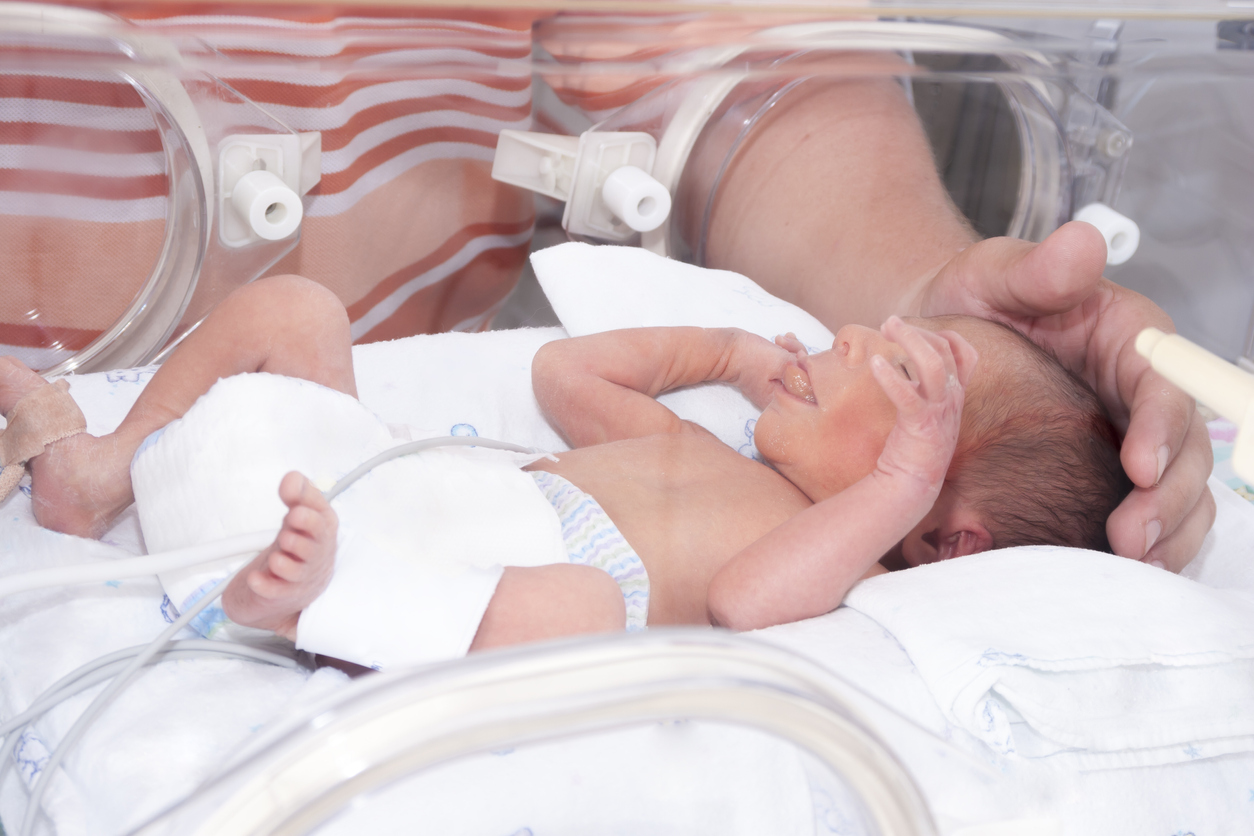
How has the DPNN been received?
In September 2019, the DPNN was ‘Highly Commended’ and shortlisted in the Innovation category at that year’s British Medical Association Patient Information Awards. The reviewer from the BMA who looked at the DPNN commented:
This is a well-conceived resource that provides information to families that is not easily obtained elsewhere. As you move through the resource, you can see the ethos unfolding to good effect. As I read through the resource, its benefit became clear.
Emma Norton, a neonatal nurse at Royal Cornwall Hospital Treliske, who worked with the DadPad team as the resource was being developed, has said:
DadPad Neonatal is the perfect device to bridge the gap between neonatal services and dads, helping them understand the terminology and processes their child may be involved with. The DadPad cards are a perfect communication device for neonatal units, where the sensitive nature of the units means that it is extremely important for dads to understand what is happening, be able to ask for help and therefore feel supported.
We are so thrilled to be one of the first two units in the country to be utilising DadPad Neonatal and feel it will be a huge asset to our teams and our parents.
Senior advanced neonatal nurse practitioner, Fiona Cramb, at Poole Hospital – where she was part of the working group that helped develop the DPNN, has added:
Neonatal units are busy. It can be a rollercoaster ride for parents and, unfortunately, it is easy for dads to feel left out. So, to have something that gives them the information they need in such a usable format will really help.
[And the DPNN]…can be used as a resource for mum, grandparents and other family members, too. It will enable parents to feel more comfortable about asking questions and for staff in initiating conversations.
We’ve also had some fabulous feedback from neonatal dads over the years, including this comment from Lee Pedley, a specialist nurse and former Health Visitor in Cornwall, as well as having had personal experience of being a neonatal dad, who we spoke to back in the summer of 2019:
I hadn’t seen the DPNN until you sent it to me. WOW – what a resource! Having spent 11 days in neonatal with my first child and experienced first-hand the terror that this can induce, I only wish I had had this resource at that time. Every father (and mother!) should have the DPNN made available to them as soon as their baby is admitted to the neonatal ward. I particularly like the way that the medical equipment has been photographed and explained.
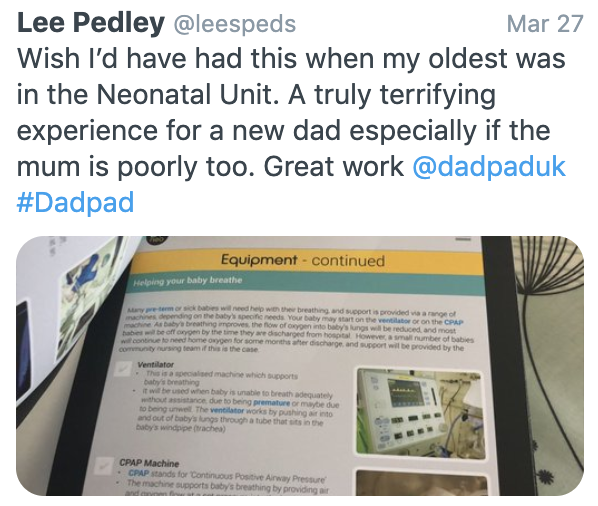
How do I get a copy of the DadPad Neonatal?
If your baby is admitted to a Neonatal Unit which has purchased a bundle of DPNNs to support their dads, you should be handed your own copy for free upon arrival at the Unit.
If you’re part of a Neonatal Unit that would like to find out more about commissioning a set of DPNNs to use with the dads on your Unit – to help enhance your embedding of the FiCare Model – please send a message to Julian at DadPad, or call him on 07403 274757.
As the DPNN is intended to be used as part of an integrated model of care within a Neonatal Unit, rather than as a standalone guide for dads, it is not currently available to purchase as an individual book.


